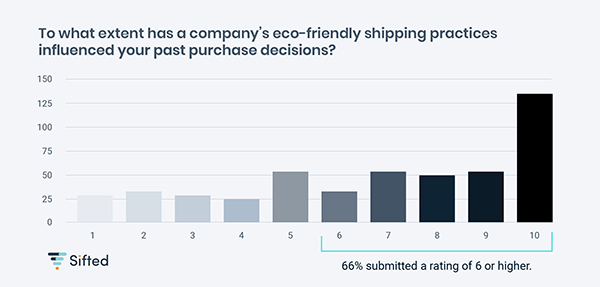It’s no surprise; consumers are becoming more environmentally conscious, and they’re expecting the same behavior from the brands they buy from.

How much do consumers consider a company’s eco-friendly practices when buying online? And if they do, would they be willing to pay more and wait longer for eco-friendly shipping?
Sifted, a logistics intelligence software provider, surveyed 500 individuals to determine that.
Here are the results:
The green consumer has been on the rise for years, so the fact that most consider eco-friendly practices before buying shouldn’t shock you. However, you might not realize the full extent of the “eco-friendly” influence.
When asked to rate to what extent a company’s eco-friendly shipping practices influenced a past purchase decision, 66% submitted a rating of 6 or higher (on a scale of 1 to 10).
Additionally, most consumers are researching eco-friendly practices. Only 21% of respondents say they never do.
The bar is set higher for name brands. Among those who rate brand recognition as “very important” in purchase decisions, 57% “frequently” research a company’s eco-friendly practices, compared to 7% who responded “never.”
Frequent online shoppers are more likely to be eco-conscious. Eco-friendly practices are either “important” or “very important” to 72% of respondents who receive five or more packages per month, compared to 65% of those receiving one or two per month.
Extra packaging, such as large boxes, styrofoam peanuts, and bubble wrap might seem like a good investment to protect your product – but what do consumers think?
When asked if they believe most companies use excessive packaging, 81% of respondents believe they do (rating a 6 or above on a scale of 1 to 10).
Even the less eco-conscious consumer thinks package sizes are getting out of hand. Of those that say eco-friendly practices are “not important” in purchase decisions, 56% still feel that most companies use excessive packaging. Among participants that say they never research a company’s eco-friendly practices, 62% think it’s excessive.
The environmental impact of this isn’t lost on consumers, who overwhelmingly agree that packaging affects sustainability. 66% feel package size has a moderate to high impact on sustainability, and 74% feel packaging materials have a moderate to high impact.
The “Amazon effect” has made two-day, one-day, and same day shipping a standard expectation. As a result, 74% rate it as either “important” or “very important” when making an online purchase.
But don’t assume that speed is everything, especially compared to sustainability. 82% of respondents are willing to wait at least one extra day for eco-friendly shipping. 17% would wait three additional days.
Remarkably, those expecting speedy shipping are slightly more willing to wait longer for eco-friendly shipping. Of those who find shipping speed “very important,” 83% would wait at least one extra day.
Not all consumers understand how speedier shipping increases carbon emissions through less efficient delivery routes. 13% of respondents believe shipping speed has “no impact” on sustainability – more than any other factor. However, those that are aware are overwhelmingly willing to wait longer for their package.
Of those who believe shipping speed’s impact is “moderate” or “high,” 84% are willing to wait at least one extra day, while 66% would wait two extra days, and 18% would wait for three.
It shouldn’t come as a surprise that price is an essential factor in purchase decisions. 92% of respondents agree it’s at least “somewhat important.”
However, they don’t necessarily value dollars over the environment. Although 92% think price is “somewhat important,” 88% say the same about eco-friendly practices; not far behind.
If you’re worried about any additional costs associated with sustainable shipping and packaging, rest easy knowing that most consumers are willing to offset them!
57% of all respondents are willing to pay 10% or more for eco-friendly shipping and packaging. Even among the most price-conscious respondents (those saying price is “very important”), 80% are willing to pay at least an extra 5%.
Maybe you’re not ready to change your supply chain in the name of sustainability. That’s fine, but you should still consider offering eco-friendly shipping and packaging as an option. Your customers want to see it.
When asked if they believe companies should offer “eco-friendly shipping” as an option at check-out:
Overall, 91% think an eco-friendly shipping option should be offered. Even among those who say eco-friendly practices are “not important” when shopping online, 73% think it should be offered. Of those who do value sustainability (say eco-friendly practices are “very important”), 98% believe the option should be available.
E-commerce is projected to expand by $1 trillion before 2025. As a result, consumers are thinking more about the environmental impact of their dollars spent. As these trends continue, it will become crucial that shippers adopt eco-friendly practices. Not only will it reduce your carbon footprint, but it could even provide a competitive advantage.
About Sifted:
Sifted, the leading logistics data-science platform, can provide a single point of visibility to reduce your supply chain’s carbon footprint. Fueled by powerful AI, Sifted simplifies supply chain complexities through clarity, control and visibility into shipping operations.
About the author:
George Meier is the Chief Business Development Officer at Sifted, a logistics intelligence (LI) platform empowering shippers to make smart, data-powered business decisions. Meier has over 20 years of experience in transportation operations and sales management.
Scott Ellyson, CEO of East West Manufacturing, brings decades of global manufacturing and supply chain leadership to the conversation. In this episode, he shares practical insights on scaling operations, navigating complexity, and building resilient manufacturing networks in an increasingly connected world.